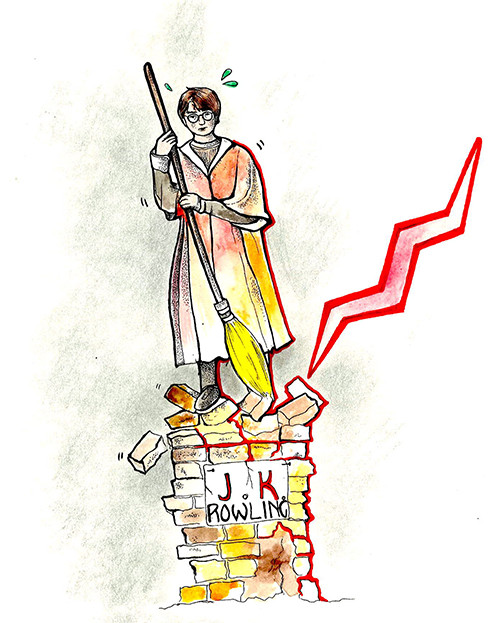There’s nothing magical about TERFs
When it’s no longer possible to separate the art from the artist
It makes sense that, after years of working as an educational assistant, my mom recently became a school librarian. Like me, she’s a writer, and many of my childhood memories involve books. We often went on excursions to the public library and stayed up past my bedtime reading together.

Illustration by Gabrielle Funk
We continued this practice well into my teenage years, as we devoured each installment of the Harry Potter series by J.K. Rowling. The magical world of Hogwarts, flying broomsticks and “liquid luck” was our common ground, even when we seemed to disagree about almost everything else. Now, a shared love of the series is the main way I bond with my young niece.
The books aren’t perfect. Their lack of openly queer characters and racial diversity bothered me years ago, but, in a way, I was willing to suspend my disbelief at their non-existance to focus on the (Triwizard) tasks at hand. However, it’s irresponsible for readers to ignore issues that directly extend into the real world.
Rowling has a long-documented history of transphobic comments, many of which resurfaced this summer. In June, Rowling (who also publishes under the moniker Robert Galbraith) retweeted an op-ed piece that used the inclusive phrase “people who menstruate,” apparently, as Glamour put it, “taking issue with the fact that the story did not use the word women.”
Rowling later penned an essay that both condemned the TERF (trans-exclusionary radical feminist) label she claims is tossed about the internet and solidified her status as part of that group. Her arguments are reductionist, insulting and downright harmful.
It’s much easier for me to skip the new Louis C.K. comedy special or ask my wedding DJ to add songs by Michael Jackson, Chris Brown and R. Kelly to my “do-not-play” list. Their works, especially Jackson’s, are iconic to some and culturally significant to many – but my apartment isn’t full of solitary white gloves.
As Lindy West writes in her essay collection The Witches Are Coming, “separating art from artist, to some degree, may not be a choice. We can’t un-Michael-Jackson music or de-Alfred-Hitchcock film – nor, necessarily, should we.”
I write this with a Marauder’s Map-patterned hair scrunchie beside my laptop. I remember dressing up for midnight movie premieres and playing Harry Potter-themed games of 20 Questions. My husband and I still talk about our favourite beer cart vendor from a pre-pandemic trip to The Wizarding World of Harry Potter in Orlando. My fanfiction probably still resides in some corner of the internet, for crying out loud.
As Toronto Star op-ed contributor Sarah Wallace writes, “it is disheartening when the creators of our heroes ... reveal themselves to be more like the villains they wrote about than the heroes we looked up to.”
It’s dangerous when these creators have large platforms, dedicated fanbases and celebrity status. Rowling has a responsibility to do better, especially since her most famous novels are intended for young readers and preach ideas of love and acceptance.
“In the age of information, ignorance is a choice,” Wallace continues. “She is purposefully choosing to fearmonger, speak half-truths and deny facts, creating an echo chamber of ignorance, rather than accuracy.”
If reading about Harry’s misadventures in the Forbidden Forest still brings you joy, don’t stop. But, if you’re cisgender like me, it’s especially important to also read up on trans issues. Learn the facts and hear people’s stories, because you won’t find them in the pages of Deathly Hallows or Troubled Blood. The latter, her most recent release, “appears to lean into problematic stereotypes portraying transgender people as villains,” according to the Los Angeles Times.
It might not be possible to take down Rowling or ignore her works, but we can at least speak up when someone echoes her transphobic views. After all, as Albus Dumbledore famously said, “it takes a great deal of bravery to stand up to our enemies, but just as much to stand up to our friends.”
Danielle Doiron is a writer, editor and marketer based in Winnipeg. She’s spending the pandemic reading, practicing yoga and stubbornly refusing to clean the apartment.
Published in Volume 75, Number 06 of The Uniter (October 22, 2020)






